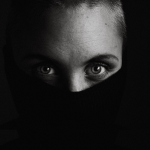Everything makes Andrew laugh – the menu, a wicker basket of small seeded loaves, the sommelier who invites him to taste the wine. He laughs when a waitress strafes the fawn tablecloth with a narrow steel wiper. It’s the private mirthless laugh Julia knows so well, incidental music to Andrew’s unease.
They are seated by the window, looking out through blinds at the riverside embankment.
Andrew wants to map out the terrain of their date, its obstacles and blind bends, so that he can lay his traps for Julia. He can see that she’s made an effort: he recognises the amber pendant at her throat, worn in tribute to the one Christmas they spent together, five or six or – no, it must be ten years ago now.
He reaches towards her to touch the stone. ‘We’ve known each other longer than we haven’t known each other.’
She knows what he means. He forks some spinach from her plate.
*
The restaurant sits upon the site of some ancient exhibition. ‘The nineteen-fifties,’ murmurs Julia, reading a commemorative plaque set into the polished concrete wall. Andrew nods and says ‘Hmm,’ with exaggerated indifference, scrolling through his ‘phone and smiling. He’s aware of her looking out over the fountains and temporary sandpits, watching toddlers wobble between sand and stone and then crouch to examine the juncture between hard and soft surfaces, their fat flat palms patting each in turn. She irritated him once by observing that all children are scientists at heart – having two sons of his own, and knowing their ways, he didn’t need another of Julia’s aphorisms.
Julia keeps to her new policy of silence. She takes a sip of wine, just letting it wet her lips. The impasse is broken by the return of the waitress and the offer of dessert, which they accept and decide to share. Andrew leans across the gulf between them – they’re sitting along the curve of a demi-lune table – and kisses Julia’s cheek. He feels underneath layers of linen tablecloth and silk skirt for the hot skin behind her knee, which is slacker than he remembers. But she’s slacker all over – and so, perhaps, is he. It’s one of the things they notice but don’t mind about each other. He tickles her. The restaurant is almost empty now, and the waiting staff gather by the service door, un-knotting their aprons.
At the table next to them, a photographer sets up a mini-tripod in front of a tower of pink beef. The lens edges towards the meat, almost touching it: the shutter makes a deep click as Andrew watches.
*
By the time coffee arrives, Andrew is whirling Julia through the features of his new ‘phone. ‘Hmm,’ she says. She’s recently spent a morning on all fours, alternating between the back of her computer and a customer service line, growing frantic at the circular instructions received. In tears, she had thought of all the people she bumped into every day, casually mixing music and creating artworks, editing movies and streaming live television – while she, Julia, could barely send an email. They had been frightened tears – the tears of someone losing her way: someone perceiving her own isolation.
But she can’t ask Andrew for help – he doesn’t like to be asked for help. She’s getting older. Needier.
It’s a long time since he’s visited her at home. A shyness has grown between them.
‘…honestly, that’s the way to make a fortune,’ he’s saying. ‘Invent an app. It’s like a gold rush.’
‘What app would you invent?’
‘Just the usual. One that makes women’s clothes invisible. One that tells you what other people are thinking.’
‘You could buy your own island.’
She looks down at her fingernails, for some reason painted a startling, glow-in-the-dark orange.
The waitress places the bill in front of Andrew. Julia glances at it, and lays her credit card over it with a shiver of embarrassment.
‘Happy birthday,’ she says, belatedly.
‘Thank you,’ he shrugs, looking out through the golden windows.
…
Biography
Josie Turner lives in Kent and works in London. She has had fiction and poetry published in journals including Mslexia, The Frogmore Papers and Luna Station Quarterly. In 2016 she won the Brighton Short Story Prize and received the Sue Lile Inman award for fiction from the Emrys Foundation.
…
Image: pixabay.com





